How to Keep Your Baby’s Hands Warm at Night
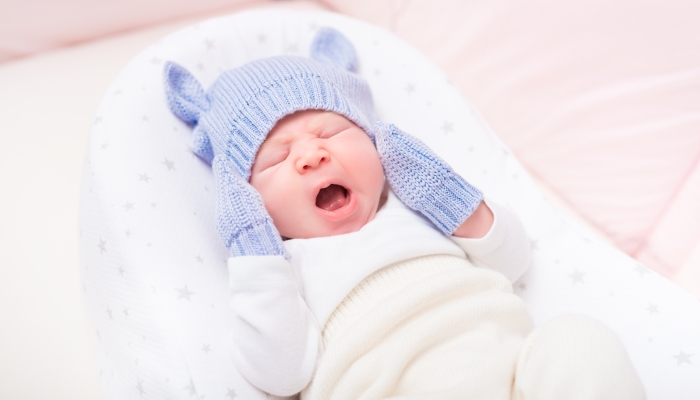
- A baby’s blood usually flows to their hands and feet last, causing cold hands and feet at night.
- A sleep sack will not only keep your baby warm at night, but it might even help them sleep longer.
- Baby mittens will not only keep your baby warm at night, but also prevent your baby from scratching their face.
Each time I’ve brought home one of our sweet babies, I’ve performed the same sleep routine. I put them in a long sleeve cotton romper, wrapped them snugly in their receiving blanket, and put them to sleep in their bassinet. Yet, each child figured out how to pop their little arms out of the blanket.
When I’d check on the baby in the middle of the night, their little hands would be freezing cold. It made me feel terrible and wonder if their body was cold too. I’d check to be sure their tummy was warm and then wrap their arms inside the blanket again.
As parents, we’re always concerned about keeping our babies warm at night. Frigid winter nights can make us even more paranoid about their core temperature. But is there cause for concern if your baby’s hands or feet feel cold at night?
If you’ve got a little one with icy-cold hands, don’t worry. There are ways you can keep those little fingers toasty and warm. If you’re wondering how to keep your baby’s hands warm at night, we’ve got the answer.
My Baby’s Hands Are Cold at Night: Should I Worry?
Thankfully, an infant with cold hands or feet is rarely a reason to worry. This is actually a normal part of development for a baby. As long as your baby’s core temperature is normal, they aren’t in any danger.
Your baby’s body temperature should feel warm but not hot. If you notice cold hands, feel their chest and tummy to check your baby’s temperature. If they still feel cold, hold them close to your chest and wrap them in a blanket until they warm back up.
Unless your baby’s cold hands appear alongside a high fever, vomiting, or breathing trouble, there is no need to worry. If you do notice those symptoms, contact a doctor immediately as this could be a sign of an emergency.
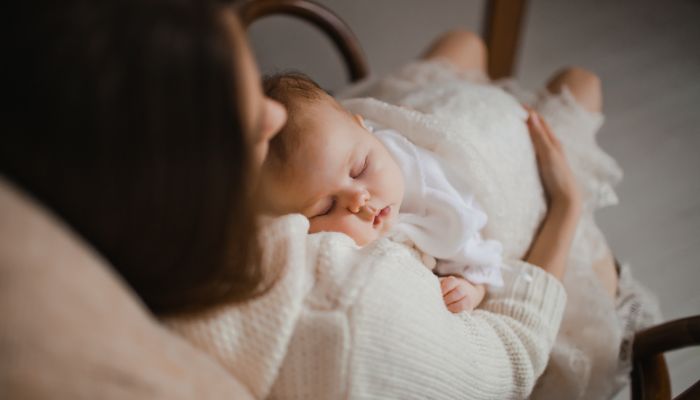
Why Does My Baby Have Cold Hands at Night?
When babies are young, their bodies circulate blood to their vital organs first. The lungs, heart, and other core organs get the most blood flow because they are essential for survival. The body prioritizes keeping these parts of the baby warm.
In contrast, the body knows that hands and feet aren’t vital organs. A baby’s blood usually flows to its hands and feet last. This is the reason behind a baby’s cold hands and feet at night.
Do You Need to Cover Your Baby’s Hands at Night?
A baby with a warm body temperature will sleep more soundly. This is why keeping a baby warm and covered at night is important. This is especially true for newborns.
Newborns aren’t able to keep a consistent body temperature as well as older babies. It takes time for their bodies to be able to regulate their temperature and prevent drastic temperature drops. Keeping your newborn’s hands, feet, and core covered at night will help their body stay at the correct temperature.
How to Keep Your Baby’s Hands Warm at Night
Many parents have struggled to find ways to keep their baby’s hands warm at night. They’ve often tried a variety of methods only to wake up to a baby with bare, cold hands. I speak from personal experience when I say that babies are great at escaping swaddles and mittens.
However, there are plenty of strategies that do work. Here are a few things you can try to keep your baby warm and their hands and feet covered:
Use a sleep sack.
If you’ve never heard of a baby sleep sack, you’ll want to look into this. The benefits of a sleep sack are numerous. They’ll not only keep your baby warm, but they might even help them sleep longer.
A sleep sack is designed to cover your baby while they sleep safely. Think of it like a wearable blanket. A wearable blanket usually has a zipper opening that you can secure shut to keep the sleep sack in place.
Many of the long sleeve sleep sacks come with mitten cuffs that will keep baby’s hands warm. If you’re looking for a sleep sack for cold winter nights, polyester fleece sleep sacks are a great option.
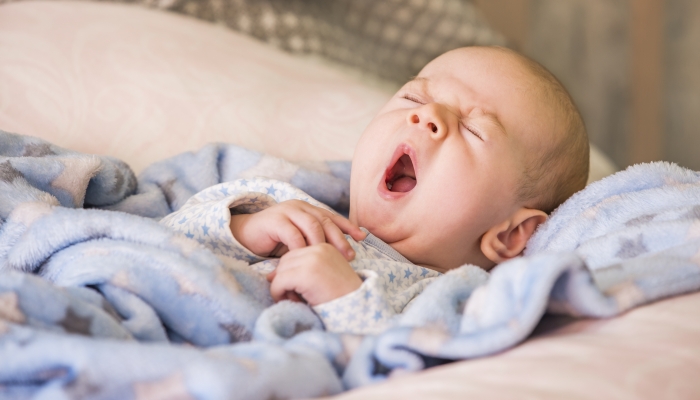
Keep the baby’s room warm.
Notice we said warm, not hot. It’s extremely important that your baby doesn’t overheat. This can increase your baby’s risk of sudden infant death syndrome (SIDS).
However, keeping your baby’s room at a comfortable temperature will also help prevent cold hands. Many health professionals will recommend somewhere between 68 and 72 degrees Fahrenheit (20-22 Celsius) as a guideline for safe room temperatures. The AAP’s Safe Sleep guidelines don’t mention a specific temperature but do say that overdressing your baby should be avoided to lower their SIDS risk.
As a general rule of thumb, dress your baby for bed the same way you dress yourself and add one extra layer. The extra layer can be a swaddle or sleep sack.
Put mittens on your baby’s hands.
Not all babies will keep these on at night, but they are still worth a try. Baby mittens are designed with special velcro or elastic that secures the mittens around a baby’s wrist. They not only keep your baby warm at night, but will also prevent them from scratching themselves.
Infant mittens come in a variety of materials. From fleece to wool to cotton, you have plenty of choices for protecting those tiny fingers from the cold air. In a room between 68 and 72 degrees F, simple cotton mittens should be enough.
If you find that your baby’s hands are coming out of the mittens at night, try tucking them under their long-sleeve pajamas. You can also use them inside a swaddle.
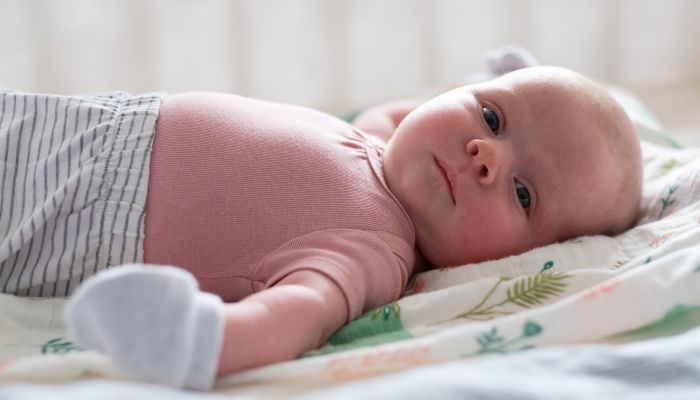
Prewarm the baby’s bed.
If you’ve never heard of this age-old trick, it’s a great way to keep your baby warm at night. Try prewarming your baby’s bed with a hot water bottle. Similarly, you can use a sock full of dry beans heated in the microwave.
Before your baby lays down, place the hot water bottle or heating pad in your baby’s crib on the mattress. Allow it to warm the bed and remove it before placing the baby down. You should always test the bed temperature first, making sure it’s only warm to the touch, not hot.
Pre-warming the bed will help keep your baby warm after you initially lay them down. Oftentimes, it takes a while for their bodies to adjust and create enough warmth to be comfortable in the cold air. This will speed up that process.
Never leave a hot water bottle in the bed with your baby. Any objects in the bed pose a suffocation risk. The hot water can also burn your baby or cause them to overheat if left next to them.
Tips to Make Sure That Your Baby Is Warm at Night
On cold nights in the winter season, parents are often looking for ways to keep their sleeping baby warm. Many parents wake in the night, worrying that their baby might be uncomfortable and cold.
These tips will help parents sleep more soundly, knowing their baby is safe and warm:
Check your baby’s temperature.
If you really want to keep your baby warm at night, you can keep a crib room thermometer attached to their bed. These thermometers measure the air temperature right around your baby. This will give you an idea of how comfortable your baby’s sleeping environment is.
You can also check your baby’s temperature with a forehead thermometer. A temperature below 97.9 F might indicate hypothermia. A temperature above 100.4 F indicates a fever or the baby is overheating.
Dress your baby appropriately.
You might be wondering how many layers are too many, or what your baby should wear under a swaddle. It’s actually quite simple.
To keep your baby warm at night, start by dressing them in one layer appropriate for the season. When dressing your baby for sleep in cold weather, a long-sleeve onesie or a pair of footie pajamas would be appropriate. During warm months, long sleeves to cover your baby’s arms aren’t necessary unless the room is cold.
Then add one overall layer like a wearable blanket, receiving blanket, or swaddle. This will help hold in your baby’s body heat so they stay warm. To add more layers in the colder months, you can use mittens to keep baby’s hands warm and socks to keep their feet warm.
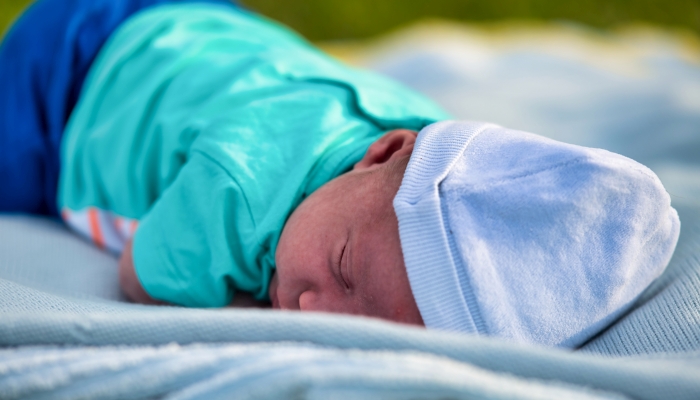
FAQs
Do babies wake up if they’re cold?
Babies will likely wake frequently through the night if they’re too chilly. If you notice your baby won’t sleep, is waking often, or seems fussy without reason, check their temperature. Keeping your baby’s feet, hands, and core nice and warm will help them sleep better.
What are unsafe methods for keeping a baby warm at night?
Overheating and suffocating are both serious concerns for a sleeping baby. You should never risk your child’s safety in an effort to keep them warm at night. Do not try the following methods:
- Letting your baby sleep face down
- Using an electric blanket in the crib or bassinet
- Using a sleeping bag or heavy blankets in your baby’s crib
- Placing a heating pad or hot water bottle in the bed with your baby
- Overdressing your baby
How do you know if your baby is too warm?
Knowing the signs of overheating is important, as overheating is a major SIDS risk. You should remove layers off of your baby if you notice:
- Red face
- Clammy skin
- Baby’s body seems warm to the touch
- Sweating
If you notice any of the following symptoms take your baby to the emergency room immediately:
- Rapid heart rate
- Fast breathing
- Vomiting
- Lethargic or unresponsive
- A temperature of 100.4 F or higher
Should babies wear mittens all the time?
Some parents choose to keep mittens on their infants at all times. This is usually to keep the your baby from scratching their own face or head, not to keep their hands warm.
If you live in a cold climate, you might want to dress baby in mittens during the day as well as at night. However, it’s not a necessity. Parents should use common sense and intuition to determine if their child needs mittens during the day as well.
When should babies stop wearing mittens?
Babies begin to regulate their own body temperatures by around 11 weeks of age. At this point, they may not need the mittens at night. However, mittens are safe to continue using for whatever length of time you deem appropriate.
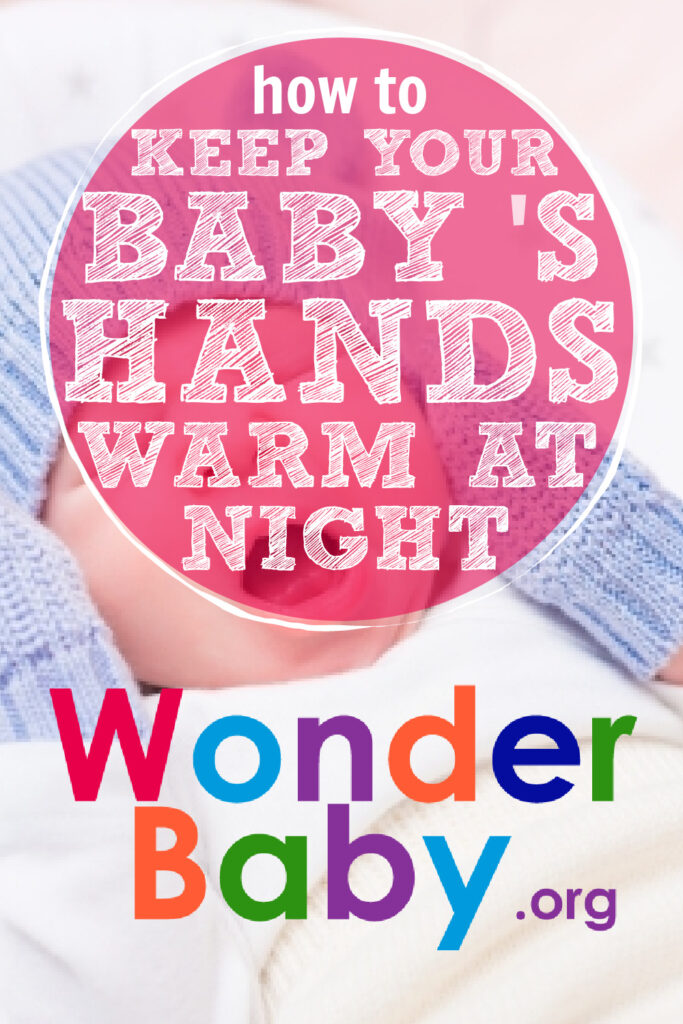
The information WonderBaby provides is not intended to be, and does not constitute, medical or other health advice or diagnosis and should not be used as such. Always consult with a qualified medical professional about your specific circumstances.
Related Posts
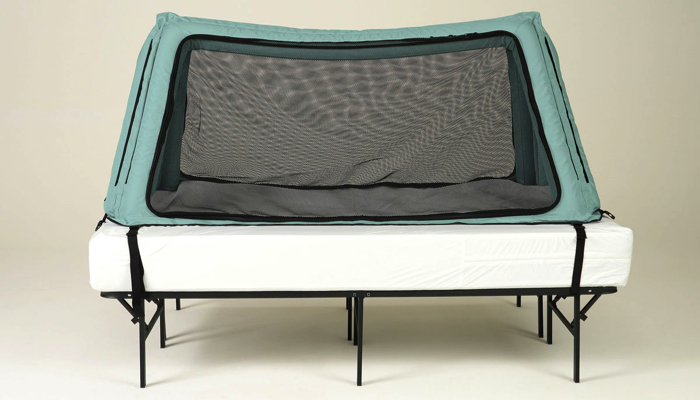
Sleep, Special Needs
Safe Place Bedding Travel Bed Review
Traveling with a special needs child can be stressful! Having a safe, durable, and easy to use travel bed can make traveling so much easier!
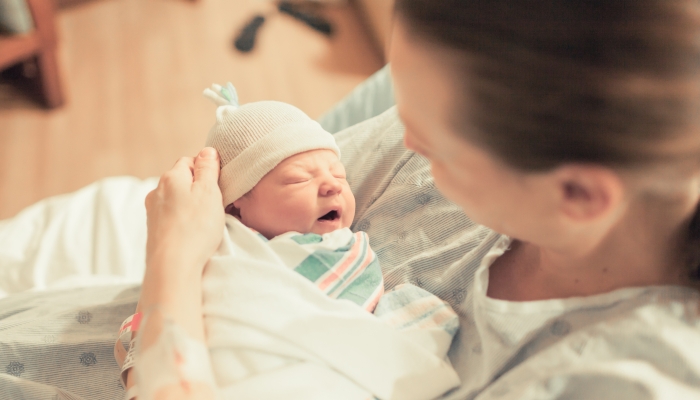
Sleep, Special Needs
Sleep Regimen for Premature Babies: Special Considerations
It can take premature babies much longer than their full-term peers to sleep for long stretches. A preemie sleep schedule may encourage better sleep.
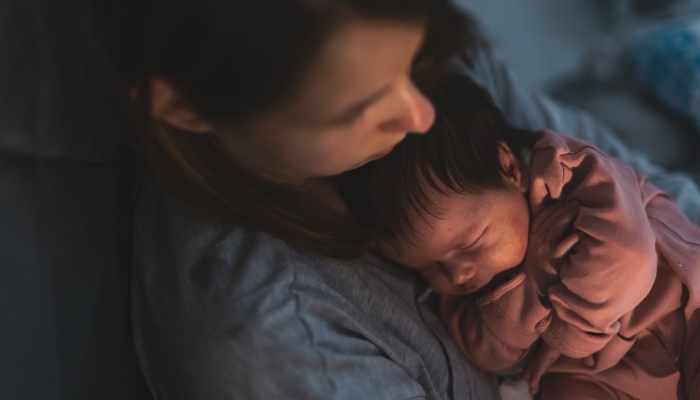
Sleep
Mastering the Bedtime Routine: 3 Tips for a Peaceful Night’s Sleep
From around six weeks, a newborn bedtime routine can help your baby learn the difference between day and night and prepare for a restful night’s sleep.